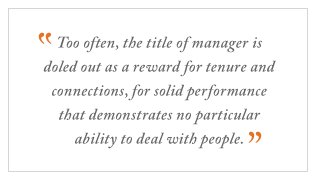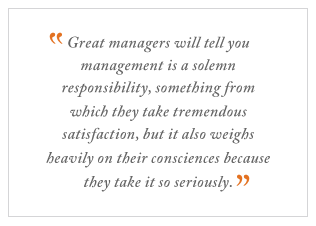"Our people are our greatest asset."
It is the strangest line in business today. No one knows who first uttered it, but it proved to be so contagious that nearly every CEO says it at some point. It's a nice sentiment to work into a speech. It's comforting. It makes the executive seem more in touch, more humane.
 |
But the statement has become a joke. Hearing the line from a company leader who had no such personal convictions, one mid-level manager turned to his friend and said it reminded him of the apocryphal story of a children's radio show host who finished the broadcast and, not realizing the microphone was still on, said, "That oughta hold the little bastards!"
The same detachment showed up several years ago at the executive presentation of 12 Elements results for a Fortune 500 financial company. "Watch out for the CEO," a colleague warned the presenter. "He's going to go after you."
The presentation proceeded without incident until it reached a slide highlighting the huge spread of engagement levels within the company. "You have at the same time some of the most engaged and least engaged workgroups in the entire Gallup database," the presenter said.
At that, the chief executive pounced. "What you just said means nothing!" he asserted. "Having some of the best and some of the worst has to be true of just about every company in the world."
The CEO was right. It is, in fact, not unusual for a large company to have its least engaged team at the 2nd or 3rd percentile, worse than all but a few percent of the worldwide scores. Nor is it unusual that a big organization's most committed team is more engaged than 99 out of 100 in that repository.
The presenter conceded the point and countered: "You're absolutely right. It happens all the time. But if I were to come in here and say you have some of the most profitable groups we'd ever seen and some of the biggest money losers, would you say that's meaningless just because that also happens at other firms?"
"I get your point," said the business leader.
Cost of lost productivity
Somehow that point gets lost on many executives. Too often, the title of manager is doled out as a reward for tenure and connections, for solid performance that demonstrates no particular ability to deal with people, or as the sole path of progress in a company that does not know how to create highly valued non-managerial positions. Enterprises that wouldn't think of letting an accounting school dropout run its finances, a Luddite run IT, or a klutz supervise safety routinely let dislikable, insincere, or aloof men and women assume stewardship for a crew of the company's ostensibly greatest assets.
In a seminar Gallup conducted for a regional bank, the middle managers in attendance were asked to write a speech to a hypothetical group of honor students extolling the virtues of the company in hopes of attracting them to join. The speeches were what one would expect: boilerplate language about the prominence of the company, chances for advancement, and the generous benefits package. After the managers had delivered these addresses to their classmates, they were challenged with a question one of these honor students might ask: "If I join your bank, can you assure me I'll have a really good manager?" The room fell silent. They looked around and shrugged. For all the grand oration they just completed, these leaders had to admit they could not guarantee this most basic benefit to a new recruit. (See "Job Seekers Ask: Who's the Boss?" in the "See Also" area on this page.)
Casually ask "Who's ripping off the company?" at an evening reception, and you will get puzzled stares. "No one that I know of," they respond. Ask "Who in this company is a lousy manager?" and the stories just keep coming. Just as people will admit to being bad with math more than they will admit illiteracy, business tolerates interpersonal incompetence where it would never allow financial malfeasance. And yet, barring a few headline-making examples of high-level fraud, companies lose far more to employee disengagement than they lose to theft.
Money left on the table
This relative negligence is the reason that while those companies actively working on employee engagement see appreciable increases, the overall trend in quality of work experience is flat. The proportion of engaged workers in the United States has ranged from 26% in 2000, to 31% in 2002, to 28% percent in 2005, to 30% in 2008. Levels of engagement appear to change dramatically not with macroeconomic swings, but only through better managers -- and the aggregate quality of managers isn't improving. The same can be said for managers in other countries Gallup has randomly sampled over the years.
The national and global results indicate that employee engagement is being destroyed in some places as fast as it is being improved in others. It's a real blind spot in the corporate world -- a rare situation in which, never mind the moral considerations, executives aren't even being selfish very well. The failure to make work more invigorating has industry leaving a lot of money on the table. The cost of lost productivity due to disengagement, conservatively expressed, is $300 billion in the United States, 226.5 billion Euro in Germany, and $6 billion USD in Singapore. The estimates are high for every country Gallup has studied.
 |
Despite the flat aggregate trend, changes at the company level are often substantial and lasting. For the publicly traded organizations that achieved top-quartile status in the Gallup database and that realized superior earnings per share growth, it was typical to see dramatic change in engagement over time. Many of these organizations started with less than one-fourth of their workgroups in the top quartile of the engagement database. By the fifth year of holding managers accountable for the 12 Elements, it was not unusual to find 60% or more in the top quartile. In the space of just a few years, the ratio of engaged to actively disengaged employees had doubled as a result of managers' sincere efforts.
Valuing finances -- and people
Ask great managers what motivates them, and you get the most non-financial of root causes for the string of ultimately profitable events. "Oh, I love them to death," said one supervisor. "Honestly and truthfully, from the bottom of my heart, there's not anyone who works on my staff that I have any hard feelings with. I feel like if I had to go to battle for them, I would, and I'll stand beside them any day for anything."
"People are more important than facts and figures," said Philippe Lescornez, a manager at Masterfoods in Brussels, a division of Mars, Incorporated. "People are very important to my happiness; I could not be happy on my own." (See "Performance Reviews Without the Anxiety" in the "See Also" area on this page.)
"Well, they're like my family," said another manager. "I want them to be as happy working here as I am. I love my job, and I've worked here for 17 years. I've always wanted to be a store manager. And I want them to always come to work and be happy."
In our studies of hundreds of thousands of managers and work teams across the globe, it is very clear that great managers have an instinctive awareness that what they are doing is contributing more than profit. Great managers achieve sustained profitability because they make a connection to something beyond profit. They see the result of their work in the life of each person they manage.
Their impact transcends mere business. For many, it is an almost spiritual issue, no matter their particular faith. Their motivation stems from deeply held beliefs about their responsibility to those around them. Whether they believe it is Providence or pure chance that puts them in the same office or factory with their team, these managers understand viscerally the scientific truth that what they do will have a large effect -- maybe a lifelong effect -- on their colleagues. They realize, given the percentage of waking time their teams spend at work, how much influence they have, not just over their people's "work life," but their whole life. (See "Your Job May Be Killing You" in the "See Also" area on this page.)
Most will tell you management is a solemn responsibility, something from which they take tremendous satisfaction, but it also weighs heavily on their consciences because they take it so seriously. With it, they say, rests not only the fiduciary responsibilities of protecting other people's money and striving for a good return, but a special kind of stewardship over people's lives. Employees say that both sides of the coin, the personal and the professional, depend on a manager who can give them the guidance, support, advocacy, and resources that motivate them to reciprocate with their best efforts.
"These are people's lives. I have an obligation," said Pete Wamsteeker, a manager at Cargill in West Branch, Iowa. "I can't make mistakes with that. I really have an obligation to do it right, and I'm going to invest the time to do it right." (See "Investing in Employees' Development" in the "See Also" area on this page.)
Therein lies the irony. The managers who are best at getting the most from people are those who give the most to them. Those who create the greatest financial performance start with the least pecuniary motivations. They work hard to do the right thing for their people, and they end up doing well.
That is the heart of great managing.
